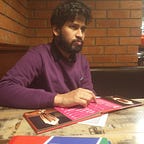Perfection or repetition when you are learning a new skill
Improvement happens over a period
Perfection or Repetition
I aim for a few things - goals. Most of us have goals, but we don’t know whether it’s our goal or if someone else has planted that in our head. This article isn’t about whether our goals are really our goals; We will save this for another time. Instead, through this article, I want to emphasize how we can approach our goals: aiming for perfection or improving over a period through repetitions.
Experiment
This example is taken from the book Atomic Habits. Jeremy Ueclsmann, a professor at the University of Florida, divided his film-photography students into two groups.
The two groups were Quantity and Quality. In the quantity group, students were assessed based on the number of photographs they submitted by the term-end. For example, a hundred photos would fetch Grade A, ninety photos would fetch Grade B, and so on.
The other group would be assessed based on quality- excellence or how good the photos were the only criteria for grading photos. These students had to submit only one photograph, but the photograph had to be of the finest quality-almost perfect for getting an A.
When the term ended, Professor was amazed to find that the quantity group students submitted all the best photographs.
Why should we avoid aiming for perfection?
Why did this happen? The quantity group of students took hundreds of pictures. Initially, their pictures were crummy, but they continued clicking photos. If a picture was bad, they would analyze it and try to eliminate the degrading factors. They tried different techniques: Playing with composition and lighting and trying various darkroom methods. Analyzing the photos gave them an idea about what they were doing wrong- these students learned from their mistakes. The result was with each photograph, the photograph quality improved.
In contrast, the “Quality group” had a vague idea about “perfection. They discussed how they could achieve perfection, came up with unverified theories. In the end, one mediocre photo is what they could achieve.
Cake baking experience
My experience with cake baking corroborates why repetitions are more important than aiming for perfection.
The government imposed the first lockdown in March 2020. My sister and I were at home when the lockdown happened. She was upset because her birthday was coming, and lockdown meant no celebration and no birthday cake. I know more important things existed to worry about-COVID 19 playing havoc with many lives - but my sister is what she is. For her, a birthday without cake was a good enough reason to be upset about.
I thought of baking a cake for her. I did bake a cake, but since it was my first time, the cake was not good, not bad. It could be eaten, and that was an achievement for me. But this baking event evoked the Baker inside me, which I never knew until then; I started baking every 10th day. Needless to say, I was enjoying it, but I wasn’t happy with the results. The initial cakes looked anything but cakes. It lacked the cake texture-spongy, fluffy. Instead, my cake would be overly dense; it looked like a halwa.
Baker inside me
But I continued my baking experiment because the Baker inside me wouldn’t let me stop. The Baker would say, “you can do it, Suryash. No one was born a baker.” I listened to the Baker inside me, and I am glad I did because my cake started getting better after 6–7 baking rounds. Without realizing how far I had come, my cakes started resembling a cake than a halwa. It had become spongier, fluffier- cake texture.
My baking mistakes
So, what did I do to improve my baking skills? Well, in the initial days, I wouldn’t measure the proportion of ingredients accurately. Instead, I would guess it and add all the ingredients, especially the sugar and flour.
Second, the flour quantity that I took for my cake didn’t match the quantity demonstrated in the video. Yes, I watched amazing YouTube cake baking videos. I realized that if we want to make a respectable cake, every ingredient’s quantity is interdependent. For example, if we take 200gm of flour, the butter and sugar will be in proportion to the flour quantity. We cannot use the same amount of sugar, butter in a 300 gm flour cake that we used for a 200gm flour cake. I would never take ingredients in proportion to one another.
Third, I would overmix the cake batter. I would mix, mix, mix and mix the batter-maybe I picked this habit from how food is stirred in my kitchen. I learned that overmixing is bad for the cake. I understood that if I keep doing the same thing, I will end up with a halwa.
Learning from my mistakes
I started doing things differently. I calculated the exact quantities of each ingredient and ensured that they were in proportion to each other. My sister thought I had gone crazy to calculate with a pen and paper in the kitchen. I gave up the habit of overmixing; I mean, after a few baking attempts, our baker instinct will direct us when to stop mixing the batter.
Repetitions and learning from your mistake
Repetitions are why improvement happens, but repetitions alone will not bring progress. Learning from your mistakes is equally important. So, repeat and learn from your mistakes to become better at what you are doing. Whether it’s writing, sport, or any subject, show up every day and practice that skill.
